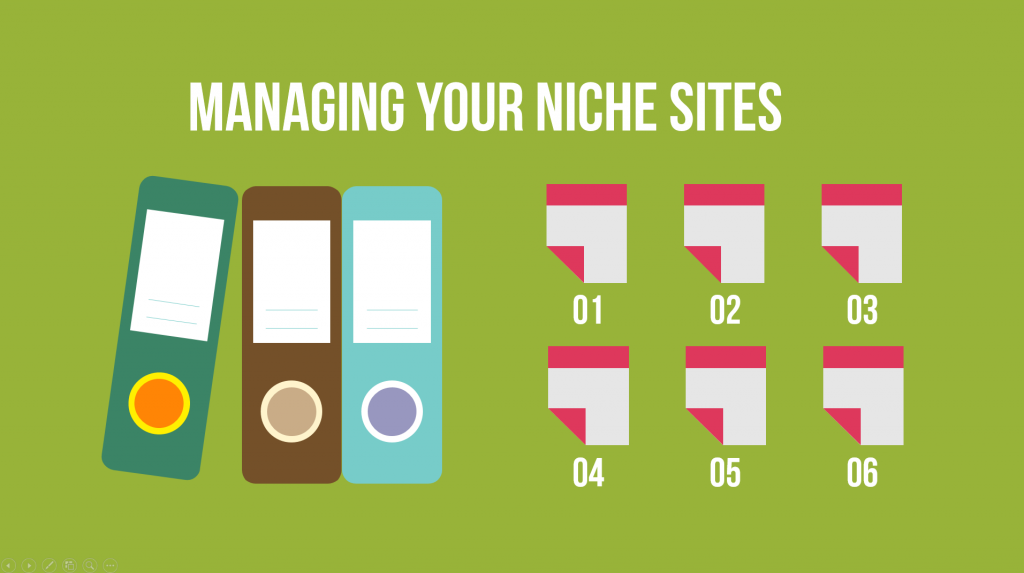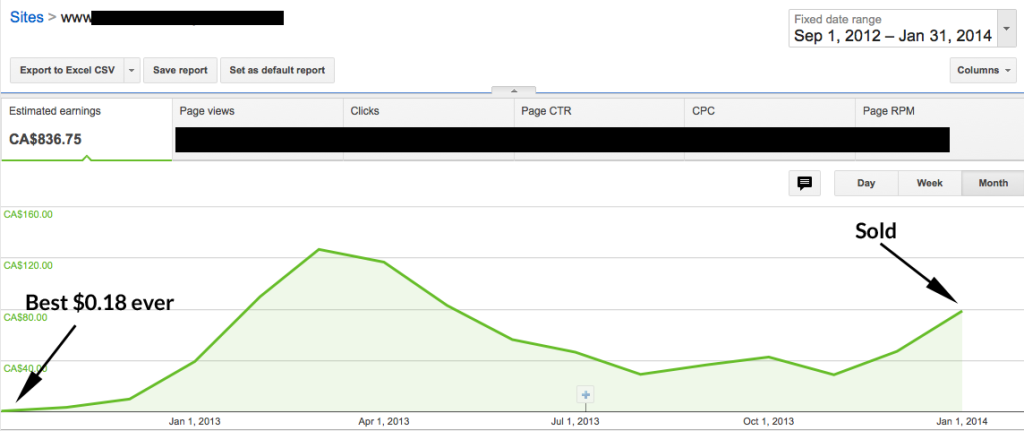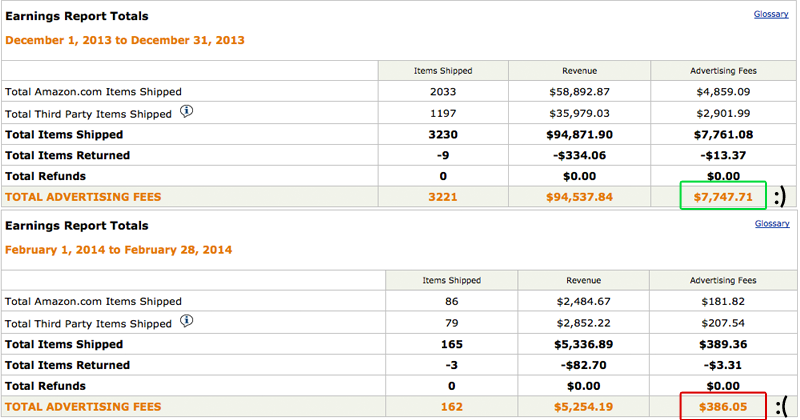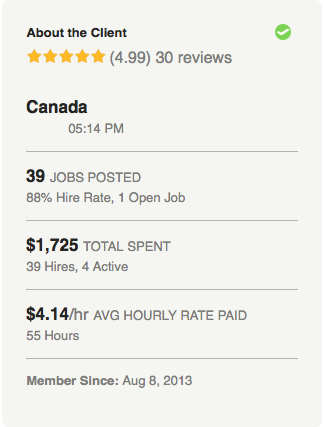- You are here:
- Home »
- Niche Sites
- » Managing Your Niche Websites

Managing Your Niche Websites
I've got something really meaty today so close the Facebook tab and make yourself comfortable. If you're serious about making a full time living online, then you're going to find this pretty interesting.
We're going to be talking about creating a Niche site portfolio using SEO and we're not going to leave any stone unturned. But before we start I just want to warn you , this is not going to be like a lecture by some professor. We are going to focusing on actionable information.
What I want to talk about today is how to manage this all and set yourself up for success, even with the challenges of Google and it's infuriating algorithm updates.
So why should you listen to me?
That's a fair question but the answer is simple. I'm not claiming to be a ‘goo roo' or a multi millionaire marketer. I'm too lazy to be either of those things. What I have managed to do is turn ranking Niche websites into a full time gig. This is how I support my family and these days, I live a comfortable life.

I'm going to be talking about what I have done, or do on a day to day basis, so this is real life, actionable content from someone who's managed to cut through all the noise and shouting that comes with trying to make money online and has found the right things to focus on to make it work.
Life for me can be a bit of a roller-coaster. Some months have been awesome, others hardly worth writing home about. That's the nature of the beast. But over the last few years I've managed to put systems in place that's helped rinse and repeat the process so I am in a much more stable position these days, which my wife loves. She hated the unpredictability of it all.

February earnings were a measly 5% of the $8000 earned in December (.co.uk and .ca earnings not shown).
So let's get down to it.
Systems
This is critical to making niche sites work on a full time scale, but they are not easy, it's going to take some hard work to master but it's definitely worth the journey.
To be fair I didn't invent this particular wheel. I think I fine tuned the systems I use but a lot of my inspiration comes many of the amazing blogs like, niche site project, texfly and authority website income.
So what systems are we talking about?
To make sure we're on the same page, when I talk about systems I mean processes set up to ensure we work effectively and avoid wasting time, especially on the tasks that have no real effect on your ability to get results in your business.
Systems also allow you to be able to measure and improve your work flow to maximize your time and investment, and ultimately maximize profits.
Set up correctly, systems can tell you what to do in each aspect of your business. Step by step. If you have found a way for doing something that really works well, why not make it the standard way you do that same thing in the future? Even better, write it down so you can show VA's exactly how you want it done whilst you focus on other things.
Let's start right at the beginning. Let's use the example of launching a new niche site.
Do you have a system in place for creating a new site? Because since I've implemented mine I managed to save money and a lot of time by making sure I do things the same way, and I don't miss a step.
Let's take starting a new site as an example. Do you have a system in place for putting a site together?
Here's some of the steps I have in my process.
- Keyword Research – picking the right foundations to the site. Finding keywords with enough traffic but not high in competition.
- Select Monetization – Deciding early on I know how I'm going to get paid. From affiliate products to Adsense.
- Select First Silo and then 2-3 silos for future development – Let's map out the flow of the site and the flow of link juice with our silos.
- Map out the articles required including titles and descriptions
- Outsource content (normally 7-8k words)
- Buy domain / hosting.
This is a snapshot of the document I have for my launch process. It's something that means I don't have to spend much time making sure I've everything covered. Most importantly, It's a process I am able to give to a VA to follow because I've made it baby steps and easy to follow.
At the same time, it's interacts with other documents I have, such as my system for my WordPress setup document for all my money sites. It includes things like settings, plugins, everything I need to be able to create money sites quickly or outsource them and maintain the same level of quality I would expect if I did it myself.
When you're talking about scaling up and managing multiple money sites in different phases of development. Being able to hand off tasks to VA's is essential. Without it you'll end up doing tasks that just slow you down rather than focusing on the activities that are going to translate into money.
How to get started
Firstly, you need to start drafting each process. The idea is to be able to isolate an activity and write a A-Z instruction manual on just that task.
I've systems for money site launches, both technical and content systems. I've a system for link building, I've a system in place to activate if I get hit with a penalty. Every single activity I am required to do has it's own system.
Once you've drafted each system, you're then able to step back and make sure that the systems fit together, and nothing gets missed out. Because as much as each activity can be analyzed as 1 individual entity, very often one activity depends on another activity. A lot of what we do is connected.
So, the link building strategy I use can be influenced a great deal by the decision I make on how a money site in monetized. It's common sense stuff and once you've got it all mapped out, you'll be able to see the gaps.
And lets be clear. Just because you've got a process written out, it doesn't mean that it's set in stone. As your knowledge, skills and experience develop and grow, so will the way you create things. Your systems are forever a work in progress and setting yourself time to review your systems once in a while will make sure you're working as effectively as possible, which is the whole point of the system in first place.
How to document each system
That really depends on your personal preference. A lot of people probably have bullet point lists. I'm a visual person so I create work flow diagrams. Really simple stuff but it means that I can print it off and put it on my notice board by my desk. For me it's then on hand for me to take glances at and always be sure what I should be doing and managing.
Key points to take away
- Systems are essential for being able to scale your business.
- They are difficult to master but once you have they add a lot of value to your business.
- Section each component of your business and create a separate system for that component.
- Having trusted systems allow you to hand over tasks to VA's and be able to manage their work effectively.
- Having systems allow you to focus on the really important tasks whilst ensuring quality is not lost on the other tasks.
Tracking
Being able to measure and track critical information will enable you to make good decisions in your business not just stumble around in the dark hoping for the best.
What is a good month for you? If you generated $500 from 5000 visitors this month is that a good month for you? Does it show progress? But what if you generated $550 from 3500 visitors last month?
You need to be able to track this information so you're in a position to compare and contrast and understand what's going on your business. You need to know when something is working and just importantly, when it's not because you might need to change one of your systems.
![]()
Personally, I'm a bit of a control freak, I need to know what's going on, it doesn't work for me to be scratching around in the dark hoping for the best. I like to know I'm making my decisions based on the right information.
Spreadsheets are the way to go. Now I'm not particularly skilled with spreadsheets. I can add some basic functions to make life easier but I generally keep things pretty simple.
I create a spreadsheet page for each money site and track the key information such as finances and metrics. I also create a spreadsheet that collects the key information from the site spreadsheets and creates a master spreadsheet.
I love this document because I can open it up and see in a snapshot how each of my sites are doing and what the overall picture is.
Each site's spreadsheet measures key metrics such as page views, bounce rate, income and costs, rankings and links. Then my overall spreadsheet will show me last months figures and also a % difference. So I'll know that Money Site A might only have 4000 page views but that's a 22% increase from last month. Where as Money site B) has 12000 page views but that's seen an 11% decrease since last month. In a snap shot I know I might want to spend some time reviewing money site B to see if there's a problem or it's a temporary blip.

One of the tables in an individual site tab on my Master spreadsheet.
But let me give you a word of warning. The key is to track the important metrics. The things that are going to have a say on the success of your business. Whether it's the master spread sheet or individual spreadsheet the goal is to be able to provide easy access to critical information. Too much information on the page and you'll get lost in figures. You can't track everything.
You have systems in place to make sure you get the details. I'd have a system in place to run regular reviews of a site, it's demographics and then look to split test the layout, colour etc of the site to better match the demographics. But this is not the kind of information I need to be tracking on a daily basis, it has no business being in my spreadsheet.
And that's the thing. You will miss something all the time. No system is perfect, no tacking system is perfect either. But this whole process in an evolution. Create the system to the best of your ability and as you use it, you'll see things you've missed, things that might help. Then you'll make changes as you go.
Here's a hot tip. From me to you.
One metric that often gets missed (indeed I've only just added it to my spreadsheets) is the RPM (revenue per mille) or Earnings Per thousand. Normally it's seen as an Adsense metric that tracks per impressions or page views, but it doesn't need to be limited to that. I use it based on visitors. I am able to create a snap shot of how much revenue I make per 1000 visitors that come to a site.
I use this simple equation : Earnings / Visitors x 1000 = RPM
Here's an example of my Money site A
Last month it created $500 of revenue from 5000 visitors. So that's: 500 / 5000 = 0.1 x 1000 = $100. I make $100 for every 1000 visitors that come to my money site. Good info to know.
Now lets look at the information from the month before. I made $550 from just 3500 visitors. Again that's: 550/3500 = 0.157 x 1000 = $157
WOW. That means there has been a large decrease in optimization on this site over the last 2 months. Maybe it's a seasonal thing or a blip, but maybe it's something more serious. Anyway, would I have caught it without having this metric? Maybe, possibly. But have I caught it now? Without doubt because I'm now able to present it really clearly. Why run the risk?
Kep points to take away
- Knowledge is king. You can only make decision on what you know.
- Don't fumble around in the dark make decisions based on information
- Be selective on information you track, you want a clear picture not to be lost in numbers. But don't be afraid to create systems to track some of the more detailed information that could make a difference.
- RPM is an amazing statistic to include, it gives you a real snapshot into how well you're doing.
Outsourcing
This is a contentious point because it divides opinion. It took me a while to see the light but these days I am a big believer in outsourcing.
Some people struggle with the concept of spending money on outsourcing as it's an unnecessary expense. Getting someone to create quality content for a money site is not cheap. At the same time, some readers wouldn't trust to give someone else access to their Private Blog Network for obvious reasons.

I prefer oDesk for all of my hiring needs. So far, I've hired writers, programmers, researchers, and site builders.
Initially I rarely used Freelancers because it was an element of trust. I'd used Freelancers in the past for other projects and I'd had a really mixed experience. I had developed a couple of relationships with designers and programmer I felt I could trust. However, I'd also met and worked with some absolute cowboys who ended up costing me money. Almost all the time, they would promise any deadline I suggested knowing full well they wouldn't be anywhere close to finishing by it. It drove me crazy.
However, having said all that, I realized that by not outsourcing I was putting a cap in my business. I could only grow to a certain size because there is just so many hours in a day.
Think about it for a second. If you use PBN's to rank your money site, and you're a believer in creating them to a standard so they would even pass a manual check, then how long would it take you to write the content on 20 PBN's? Or 50?. What about how long it would take you to format, add graphics etc and then upload all content?
Outsourcing was the only viable way to scale my business without creating a bottle neck around those time consuming tasks like content creation or site set up.
So I took another look at outsourcing with sites such as Odesk and People Per Hour. I might even use Fiverr for specific tasks.
For those who don't know Odesk or Upwork as it's now known, and People Per Hour (PPH) generally offer higher quality freelancers. But with higher quality comes higher costs. However I quickly realized paying less was a false economy.
Most importantly I found that I had to revisit how I selected my VA's. These days I spend a lot more time checking references, creating trial tasks to check for accuracy and actually interviewing my best candidates. I treat is as a real recruitment process. The results have been so much better.
With Fiverr you've got access to a lot of SEO related activities. You can get pretty much anything and everything on sites like this, you have to be careful but it's still the go to place for some tasks.
I have been known to use these places for either very very simple tasks like Logo creation for my PBN's or very specific tasks such as buying SAPE links.
The major difference when using Freelancers is that you really have to keep a tight rain on costs. Integrate VA activities one task at a time starting with the most mundane and time consuming (and often cheapest). This gives you the opportunity to control the extra costs to ensure you don't end up spending more than you make.
My suggestion is work manually yourself until you've developed some level of experience relating to the ROI you can expect from your money sites. How much are you willing to pay for a set up based on past experiences?
Once you've experience in building money sites that are profitable your able to more accurately estimate revenue which in return means you are able to decide which outsourcing costs make sense. Also the more money sites you have, the more it makes sense to use outsourcing.
Word of warning! Yes, in my opinion outsourcing is the way to go however I would really recommend learning how to do everything yourself so you have an appreciation of the tasks you're asking VA's to do.
I'm a big fan of learning every task first off, but as soon as you have a good handle on it and could teach someone else to do it, give outsourcing a shot.
Key points to take away
- Outsourcing is the best way to really scale your business
- You have to treat your VA recruitment as though you were recruiting a full time employee. Interview them, set them tasks.
- Outsourcing the mundane and time consuming tasks allows you time to focus on the activities that will make you money.
- Make sure you have a process in place so you know exactly what you want from your VA
- Learn to do each job first before you outsource it. You'll understand your VA better.
Planning and Mindset
Where I come from there's a saying that really seems to make sense when we are talking SEO. It's this:
“If you want to make God laugh, tell him your plans”
Read God, think Google.
Yes, this section IS about planning but we all know one Google update and your plans could go out the window. That's the world we live in but still it beats working for a living.

Do you know what happens when you don't have a plan with a deadline? Nothing much, that's the problem so even in this ever changing landscape we need to make plans and set up systems to help us deliver those plans.
When it comes to making plans for niche sites, there's one thing we can do to help ourselves.
Diversify.
There are several ways to monetize a site. There are different ways to generate traffic, there's a few methods to rank keywords.
My suggestion would be to create a plan that includes as much diversification as possible.
For example, include a combination of adsense and affiliate products on your money sites. Obviously focus on ranking keywords in Google because in the long term it's so beneficial but don't ignore Facebook or social media in general. Master Reddit traffic and building a following on twitter.
I'm not saying don't make your focus SEO but what happens if a algorithm change wipes out most of your traffic over night? How you earning money now?
With that in mind implement different SEO strategies. Have sites that use whiter than white hat SEO. Perhaps other money sites generate traffic thanks to parasite sites. Don't put all your eggs into the same basket. I love PBN's but it's always there in the back of mind, one day Google is going to bust me.

It's happened to the most experienced SEO guys, including me. One month your laughing all the way to the bank, your biggest worry is Paypal suspending your account. (Damn you Paypal). Google makes an algorithm update and Boom, you'r crying into your beer.
The point I'm making is that it's OK to be looking over your shoulder. You know, being a bit paranoid. It's healthy because the future is uncertain and being on the look out for change gives you the best chance possible to recognize it and adapt accordingly.
Add diversity into your plan. OK, make niche sites with PBN's your bread and butter, after all it's so effective. But use that cash to add something else to your armoury, another type of site, or another traffic source.
We source high quality domains and have this blog, to diversify our SEO based businesses like our Niche website portfolio. We've built one of the busiest and interactive Facebook groups for PBN's and SEO to be able to build relationships in our niche, to gain authority. We're launching Domain related tools.
These are all the ways we've diversified our business, so if Google slaps our money sites with an update, sure we'll be upset but we'll have other income sources too.
Earn some revenue from your new business model so you are not going to caught completely cold, and should the worst case scenario happen, you've a system in place to scale your new business model until you've got your head around the new Google update and you're kicking butt and taking names again with your niche sites.
Now for something really important.
Working from home is a unique situation, there's a lot of importance placed on having the right mindset. It's easy to procrastinate or to let the day drift. Wasting time is such a problem, after all, who's going to remind you to get back on point? I'm not preaching here, I suffer from this as much as the next man.

You're not lazy, it's just difficult and not everyone can work like that. Some people office share to be able to leave the house and be in an environment where it's not so simple to slack off.
But also, this is why planning and systems are going to help you. Have deadlines for your VA's and yourself. Keep yourself honest with challenging time frames to get things done. You won't have time to drift along.
 Work smart. Perhaps use the ABC rule? So every morning (or even better, the evening before) create a ‘to do' list. When you start work in the morning rank each activity on the list A,B,C or D. A for urgent, B for important, C for necessary D for ‘would be nice' and E for “utter waste of time”.
Work smart. Perhaps use the ABC rule? So every morning (or even better, the evening before) create a ‘to do' list. When you start work in the morning rank each activity on the list A,B,C or D. A for urgent, B for important, C for necessary D for ‘would be nice' and E for “utter waste of time”.
Once you've ranked the entire list, start with the A's and get them done. Go through all the tasks ranking A and only allow yourself to do them. Once they are done, continue with B's. This way you'll stay on track doing the most important work first.
Next we are talking about the mindset you have to your businesses. I don't mean to preach again because I've been in the same shoes as lot of my readers. Starting out you're reluctant to spend any money, maybe a few essential tools but that's it.
Then you set to work doing everything yourself manually and for Free. Create web 2.0 sites or post forum links. But usually the results are so slow people get bored and move on to the next thing.
You need to treat it as a business and all businesses make investments. Whether it's investment in training or in stock, you need to bare in mind you are going to have to pay money to make money. It's the biggest change in mindset to make. It's the difference from a part time gig to a full time business.
Yes you could do everything yourself but then perhaps you would only be able to create, rank and start earning money from 4 money sites in a year. Because it just takes that long to set everything up. That may not be enough to support you full time. Let say that each site makes you $500 a month, is $2000 enough for you? (these are just demo figures to give you an idea)
But lets say you outsource a lot of the tasks and are now able to create, rank and start earning from 8 money sites. Lets say each site cost $250 to create. Your going to spend $2000 for all 8 sites, sure, but you're also going to be doubling your earnings to $4000 a month.
The real advantage though is the increase in optimization you'll get. If your main task (thanks to being freed up by outsourcing all the other tasks) is to measure, analyze and fine tune your sites then you can expect A) more traffic thanks to having the time available to focus on driving as much traffic as possible. And B) much better conversions thanks to having the time to split test and tweak your site.
So the advantage isn't just the ability to produce more money sites, it's being able to optimize all your sites to create more revenue.
Key points to take away
- Planning is essential but it's a fluid concept, it will most likely change and you have to learn to roll with the punches.
- Prioritizing your workload each day will help you maximize your efficiency.
- Your mindset is essential to the success of your business. You need to treat it as a business. All businesses have costs, your job is to control costs vs ROI
- Use your time the most effectively. As more time you have to spend on analyzing and fine tuning your websites the more money you'll make.
That's it. That's my advice on managing your niche website portfolio. You need systems in place for everything. You need to set up and track all the critical information. Give yourself a master sheet so you have a quick snapshot of the important stats. Make sure to follow trends. How are conversions this month compared to last month?
Outsourcing is the key to being able to scale your business. But to outsource you need to have the right mindset. A business spends money to make money. The key isn't avoiding spending money. The key is to spend money wisely and to track the money spent to ensure you are still maximizing your ROI.
Systems, tracking, outsourcing, and the right mindset. Get those right and you'll see colossal improvements to your bank balance.

